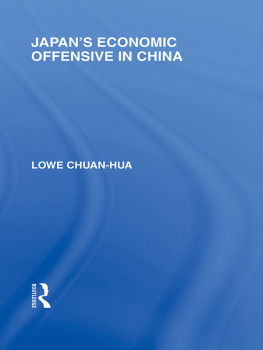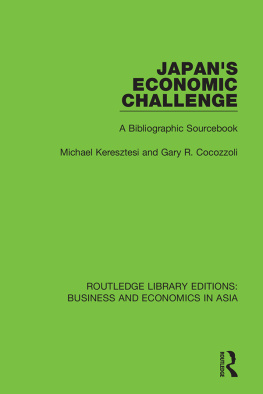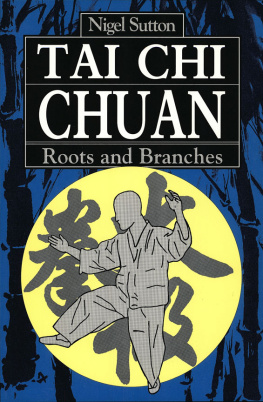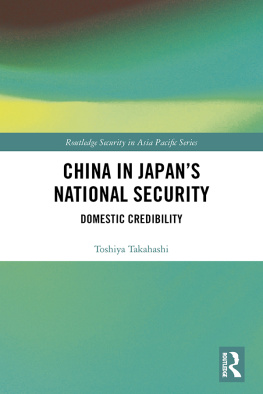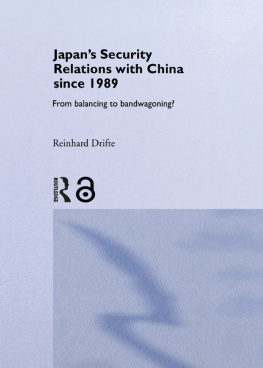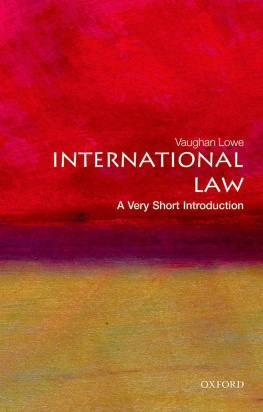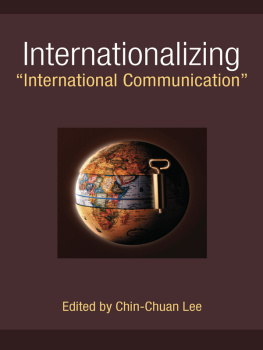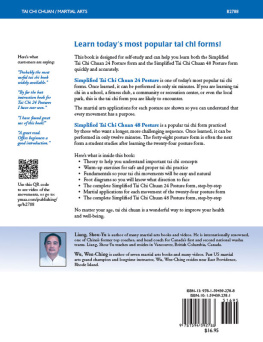ROUTLEDGE LIBRARY EDITIONS: JAPAN
JAPANS ECONOMIC OFFENSIVE IN CHINA
JAPANS ECONOMIC OFFENSIVE IN CHINA
LOWE CHUAN-HUA
Volume 29

LONDON AND NEW YORK
First published in 1939
This edition first published in 2011
by Routledge
2 Park Square, Milton Park, Abingdon, Oxon, OX14 4RN
Simultaneously published in the USA and Canada
by Routledge
270 Madison Avenue, New York, NY 10016
Routledge is an imprint of the Taylor & Francis Group, an informa business
This edition published in the Taylor & Francis e-Library, 2010.
To purchase your own copy of this or any of Taylor & Francis or Routledges collection of thousands of eBooks please go to www.eBookstore.tandf.co.uk.
1939 George Allen and Unwin Ltd
All rights reserved. No part of this book may be reprinted or reproduced or utilised in any form or by any electronic, mechanical, or other means, now known or hereafter invented, including photocopying and recording, or in any information storage or retrieval system, without permission in writing from the publishers.
British Library Cataloguing in Publication Data
A catalogue record for this book is available from the British Library
ISBN 0-203-84545-5 Master e-book ISBN
ISBN 13:978-0-415-56498-4 (Set)
eISBN 13:978-0-203-84317-8 (Set)
ISBN 13:978-0-415-58530-9 (Volume 29)
eISBN 13:978-0-203-84545-5 (Volume 29)
Publishers Note
The publisher has gone to great lengths to ensure the quality of this reprint but points out that some imperfections in the original copies may be apparent.
Disclaimer
The publisher has made every effort to trace copyright holders and would welcome correspondence from those they have been unable to trace.

The new order in East Asia that is being created by Japan.
JAPANS ECONOMIC OFFENSIVE IN CHINA
by
LOWE CHUAN-HUA
Ph.B., University of Chicago, 1923
For some time Lecturer on Chinese Affairs for the Extension Divisions of the Universities of Wisconsin, Minnesota and Kansas
1927: Associate Editor of the Peoples Tribune, Hankow
192834: Industrial Secretary of the Y.M.C.A. National Committee of China
193438: Publicity Director for China International Famine Relief Commission Member of Chinese Delegations to the 1931 and 1936 Conferences of the Institute of Pacific Relations
Contributing Editor to the China Critic and Member of the Editorial Board of the Chinese Recorder, Shanghai
Introduction by
PROFESSOR PAUL H.DOUGLAS
London
George Allen and Unwin Ltd
FIRST PUBLISHED IN 1939
ALL RIGHTS RESERVED
INTRODUCTION
By PROFESSOR PAUL H.DOUGLAS
PEOPLE are slowly awakening to the real intentions of Japan towards China. The Japanese government does not merely want to conquer China politically; it also wants to conquer it economically. The plan of the Japanese has been made abundantly clear in Manchuria during the last eight years and in the provinces which she has conquered since 1937. Not only will the Chinese people be terrorized as the Kovars have been over the course of thirty years, but all manufacturing, trade and finance will pass into the hands of the conquerors. This will mean the almost complete extinction of European and American exports into China, which will instead be reserved almost exclusively for Japanese goods. A Japanese victory in China would also probably be followed by the taking over of the Dutch East Indies either by Japan or Germany, while French Indo-China, the Straits Settlements, Siam, etc., would sooner or later follow.
There would be a large degree of poetic justice in all this were the expulsion of the Europeans to be followed by native independence. But for it to happen at Japanese hands would worsen rather than improve the lot of the native peoples.
So far as America is concerned, a Japanese victory would be devastating to her trade and position. The Philippine Islands would shortly drift into the Japanese sphere of influence and probably would be actually taken over. It is high time therefore that we reconsidered our position with respect to the Japanese attack on China. Thus far we have given our sympathy to China but have furnished our scrap-iron, copper, and supplies to Japan. With this aid Japan has been able to conquer a large part of China. Without it, she might have failed. It is time we stopped giving our tears to China and our aid to Japan, and in the cause not only of peace but also self-interest shut off the supplies upon which Japan depends. It is to be hoped that the British governing classes have been sufficiently chastened by their experience of the past year so that they will also break with their former allies whom in previous years they have actually encouraged. Mr. Lowe Chuan-Huas little book should help measurably towards these ends, since it is written both soberly, and accurately, and from a full experience.
UNIVERSITY OF CHICAGO
FOREWORD
WHEN the Japanese resumed their military operations in North China in July, 1937, they informed the world that they meant only to wipe out Bolshevism from the Far East, chastise the Chiang Kai-shek government, and eradicate the anti-Japanese activities in China. For a while these high-sounding pretexts were accepted by certain foreign nationals in China, particularly the die-hard elements in Shanghai who had hoped that a Japanese victory would check the rise of Chinese nationalism and bring about peace and order in this country, thereby enhancing the opportunities for foreign trade and industry.
But after nearly two years of brutal warfare and having now seized the leading seaports and lines of communication in the Far East, Japan no longer bothers to conceal her real motives but frankly suggests that the Western Powers should acknowledge her new position in East Asia. What do the Japanese mean by this so-called new position?
First, it would mean the ultimate economic conquest of China. Simultaneous with her military campaign, Japan has been conducting an organized economic war on China. The results of this onslaught, though not always successful or beneficial to Japans own interests, are rapidly emerging on the Far Eastern horizon and, if allowed to gather momentum, would eventually reduce the occupied regions into a state of complete servitude. Ambitious plans of economic exploitation in China have long been prepared by Tokyos brain trust, and these are being promoted in the Japanese-controlled areas without any consideration for Chinas welfare or for Western interests.
However, despite innumerable hardships and reverses, China has refused to yield, and present indications are that she will not give up the struggle. On the contrary, the Chinese government and people alike are showing an amazing ability to repair and improve their economic defence lines. It may be interesting to see how that economic defence is being reshaped and strengthened.
Secondly, Japans new position is directed at the gradual eviction of all non-Japanese interests and enterprises in the Orient. In the Japanese-controlled districts today foreign treaty rights are openly violated and foreign properties, along with those belonging to the Chinese, are commandeered and frequently destroyed. Foreign business activities, including those conducted by Germans and Italians, are being systematically strangled with the knowledge and even the backing of the Japanese military and naval authorities. All of which indicates that the Japanese war-lords are determined to establish their economic supremacy in the Far East.



